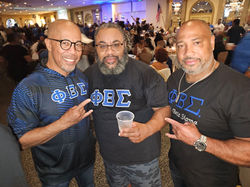Trailblazers of UMBC:
The Enduring Legacy of Zeta Upsilon
Founded on March 3, 1975, by Brothers Stephen McDaniel and Charles B. Wright, the Zeta Upsilon Chapter of Phi Beta Sigma Fraternity, Inc. began its proud legacy on the campus of the University of Maryland, Baltimore County (UMBC). Five determined young men chartered the chapter—James Spencer, Robert Rogers, Kenneth Briscoe, Eric Talley, and Walter Johnson—who shared a vision of Brotherhood, Scholarship, and Service. On May 10, 1976, Zeta Upsilon became the first fraternal Greek-lettered organization officially recognized by UMBC, setting the foundation for a strong and lasting presence on campus.
Since its founding, Zeta Upsilon has remained steadfast in its commitment to service. Since 1987, brothers have volunteered annually at the City Temple of Baltimore Baptist Church, helping to feed the homeless every Thanksgiving. The chapter has organized and led numerous outreach efforts, including tutoring and mentoring programs for Baltimore City students, community blood drives, and cleanup projects at Maryland Transit Administration (MTA) bus stops and local landmarks. In the 1980s and 1990s, Zeta Upsilon raised and donated more than $10,000 to the United Negro College Fund. These efforts reflect the chapter's deep and consistent dedication to uplifting the community.


 |  |  |
|---|---|---|
 |  |  |
 |  |  |
 |  |  |
 |  |
On campus, Zeta Upsilon has been a trailblazer for social awareness, political engagement, and student leadership. The chapter has consistently produced student leaders, including officers in the Student Government Association and the Black Student Union. In 1989, the chapter made a historic contribution to campus dialogue by hosting Minister Louis Farrakhan, generating meaningful discussion around race, religion, and politics. Additionally, Zeta Upsilon has hosted a wide variety of impactful programs centered around education, civic engagement, and cultural awareness, further solidifying its role as a campus change agent.
The chapter is equally known for its creativity and excellence in the art of stepping. Stepping has long been a hallmark of Zeta Upsilon, with the chapter earning a reputation for precision, innovation, and energy. Zeta Upsilon has won numerous campus step show competitions, culminating in national recognition when the chapter was crowned the National Step Champions at the 1988 Phi Beta Sigma Conclave. These accomplishments reflect not just talent and discipline, but a sense of pride and unity that defines the brotherhood.




Zeta Upsilon has initiated 194 brothers, building a legacy rooted in the fraternity’s principles of Brotherhood, Scholarship, and Service. And those values are reflected in the remarkable accomplishments of its alumni, who have carried the spirit of the chapter into diverse fields. Among them are Dr. Michael L. Zollicoffer, a community healthcare pioneer and literacy advocate; Dr. Lamont Smith, a veteran trauma physician and frontline responder during the COVID-19 pandemic; Dr. Manolito Torralba, a globally respected microbiologist; and Rev. Lennox Yearwood, Jr., a national activist and president of the Hip Hop Caucus. Through these men and many others, Zeta Upsilon continues to live out the ideals of Phi Beta Sigma—proving that the chapter’s influence extends far beyond campus and into the heart of the communities it serves.
